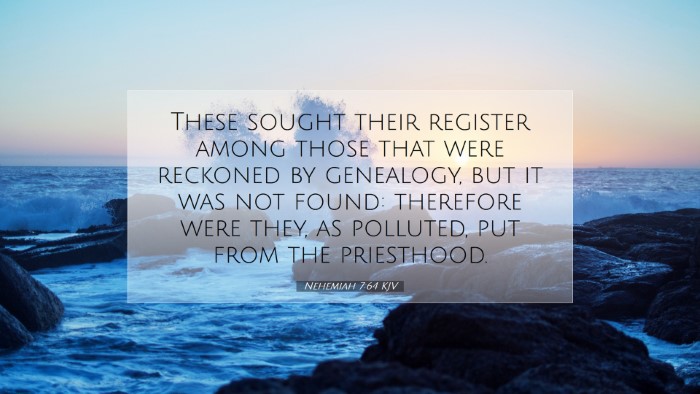Commentary on Nehemiah 7:64
Nehemiah 7:64 states:
"The children of Delaiah, the children of Tobiah, the children of Nekoda, six hundred forty and two."
Introduction
This verse is part of a larger context wherein the people of Israel are being accounted for as they return to Jerusalem after the Babylonian exile. A detailed enumeration of families demonstrates the restoration of God's people and the significance of their heritage.
General Insights from Public Domain Commentaries
Importance of Names and Heritage
Matthew Henry emphasizes the importance of names in scripture, indicating that the enumeration of the children signifies not only their numerical strength but also the continuation of God’s covenant promise through generations. Each name represents a family, a lineage, and a divine purpose.
Henry elaborates that the recording of these names serves as a reminder of God’s faithfulness throughout generations, correlating with how God established His covenant with Abraham and his descendants.
The Symbolism of Numbers
Albert Barnes interprets the numbers listed as being significant in their own right. The exact figure of six hundred forty-two symbolizes completeness and divine order, indicating that this group is intentionally structured within God’s plan for restoration. The repetition of names shows God’s meticulous care for His people.
Spiritual Lessons in Enumeration
Adam Clarke provides a perspective on the spiritual implications of such a census. He suggests that each number and name reflects the inclusiveness of God’s kingdom, emphasizing that God sees every individual as worth counting and redeeming. This notion encourages believers to recognize their unique roles within the family of faith.
Applications for Today’s Church
This verse can deeply resonate with modern congregations and church leaders. It reminds us that every member of a church or a community holds value and purpose. As pastors and theologians, we should actively recognize and celebrate the diversity of our congregations, understanding that God has a unique calling for each individual.
Cultivating Identity and Heritage
By reflecting on the historical context of Nehemiah's return, church leaders can draw parallels to their communities today. Engaging with the heritage and stories of church members fosters a stronger community. It also honors God’s faithfulness throughout history and illustrates our collective journey of faith.
Encouraging Accountability and Participation
The census serves as a reminder of the importance of accountability within a faith community. Leaders can encourage members to understand their roles and responsibilities, prompting them to participate actively in the life of the church.
Theological Reflections
The verse invites deeper theological reflection on God's providence in rebuilding not just walls, but also the community of faith. It allows theologians to investigate themes of exile, redemption, and restoration in both historical and contemporary contexts.
Exile and Return
The experience of returning from exile illustrates God's desire for His people to dwell in His presence. Nehemiah’s leadership emphasizes the importance of returning to one's rightful place, both physically and spiritually, which has continuous relevance for believers today.
Restoration and Renewal
The rebuilding efforts reflect the broader theme of restoration found throughout scripture. Each name accepted into the family of God represents renewed hope and purpose. This concept can provide encouragement to those feeling lost, reminding them of their significance within the Body of Christ.
Conclusion
Nehemiah 7:64, while it may initially appear as a mere accounting, conveys profound spiritual truths and implications that have relevance for today's faith communities. By embracing the identities of the individuals represented in scripture, we can foster a deeper understanding of our own identities as God's chosen people.
In summary, this verse challenges us to appreciate the importance of heritage, identity, and divine order, reminding us that we are all called to participate in the ongoing story of redemption and renewal that God orchestrates through His people.


